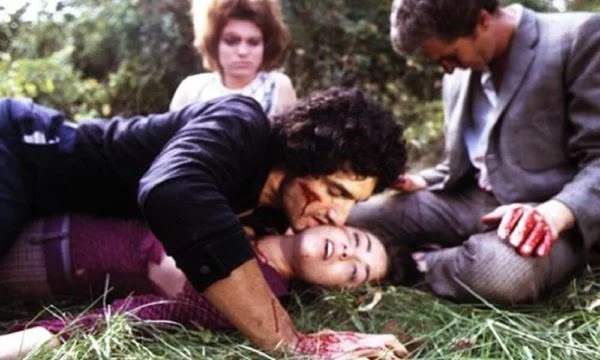Blood is life!
We're starting this year's Images of Fright Film Festival with one of the earliest if not the first ever feature horror film. F.W. Murnau's Nosferatu (1922). Imagine being an audience member in post war Germany and experiencing this film in the few theaters that screened it. It's hard to imagine that now seeing as how the character of Count Orlock and the German expressionist aesthetic of the film (as well as the copyright lawsuit) have now both become iconic. However, looking at the film with a modern eye, it has trouble holding up the tests of time.
The biggest drawback of the film is it just feels too long. The film is separated into five acts (another call back to the stage) and the first two do a good job of setting up the exposition. Acts 3 and 4 felt like they were dragging on and could have both been shorter. Add to this that you're not only reading action and dialogue title cards but also the pages of the book or notes the characters are reading. The film also runs long due to the style of stage acting used where characters will hold an exaggerated pose for a couple seconds too long in order to convey a feeling or emotion. This is understandable as cinema was still a fairly novel innovation but this technique is employed enough to where it does take the modern viewer out of the story. No one in this film is more dramatic than the lead female protagonist of the film, Ellen played by Greta Schroder.
If you're a feminist and want to see how far female representation in cinema has come, watch Nosferatu. Ellen plays the archetypal helpless woman to a tee. She is DEVASTATED that her "lover" Hutter, played by Gustav von Wangenheim has to travel for work. She apparently has no life of her own or is mature enough to care for herself because her lover leaves her in the care of his friends while he is away. In fact, she is given the first dialogue title card of the entire film and she uses it to complain about a nice gesture, "Why did you kill them... the lovely flowers?" Clingy and annoying, Ellen seems like a real fun girlfriend to have. This seemed like a wink by the makers of the film kind of saying, "You really can't win with women, am I right?" Almost 100 years later, Future would agree 100%. Ellen has no life of her own or at least one worth mentioning and is just going to be really really sad and dramatic missing her lover. She does end up saving the day in the end and putting an end to the plague but only by being a woman, that's it. It would be interesting to read a cinematic compare and contrast essay between Ellen and a contemporary strong, courageous female horror character, someone like Ripley or Madea.
I was also taken out of the film by a couple of scenes that were unintentionally comical. The first scene being where the villagers are warning Hutter about a werewolf prowling around (the implication that it is a shape shifting Count Orlock). The scene is then followed by a four-legged creature who when crosses the camera is obviously a hyena, it looks nothing like a wolf. Maybe the only canine the zoo had that day was a hyena and Murnau forgot to shoot another insert. There is another scene where the Van Helsing equivalent Professor Bulwer, played by John Gottowt is looking at a Venus fly trap with his students. When it inevitably traps a fly he tells them it's "like a vampire" and I thought "Really? That is quite the stretch." There's a scene where we get glimpses of Hutter writing a letter to Ellen who is missing him so much and it reads like a text message being sent by a teenager. Imagine deeply missing your spouse who is on a work trip only to get back , "Bruh, got bit by a damn mosquito and I'm having dreams that are weird AF. I'm cool tho lolz."
Nosferatu is a great film for it's time and should be respected for introducing horror elements we still use today. Murnau was a pioneer in cinema and deserves all the recognition and accolades. It is acceptable to enjoy the film for what it was back then and still say that it does not hold up in today's world. After all, cultures and societies are ever changing, it's not like we are eternal vampires! I'll see my way out.



Comments
Post a Comment